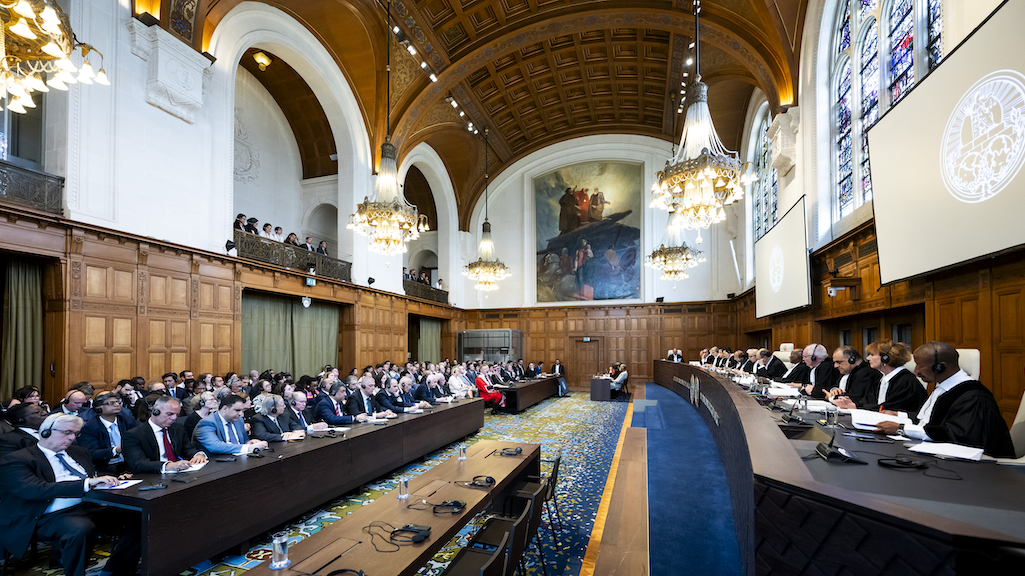International Court of Justice: One-sided Advisory Opinion; Israel’s security concerns are not considered in any way.
In its Advisory Opinion published on Friday, July 19, 2024, the International Court of Justice (ICJ) concludes that Israel’s ongoing presence in the “Occupied Palestinian Territory”, including East Jerusalem, violates the Palestinian right to self-determination and is illegal.
The court calls for Israel to bring its presence in these territories to an end “as rapidly as possible”. All Israeli settlements in these territories must be “evacuated.”
Watch Andrew Tucker explaining ‘occupied territory’ – follow 8 other short videos on the ICJ’s ruling on thinc.’s YouTube channel.
The Court calls on the United Nations to decide on “the modalities required to ensure an end to Israel’s illegal presence in the Occupied Palestinian Territory and the full realization of the right of the Palestinian people to self-determination.”
According to the Court, the illegality of the occupation has consequences for third states. For example, third states must ensure that Israel complies with its obligations under international law and ensure that all impediments to the full realization of Palestinian self-determination are removed.
The Court’s findings and conclusions were supported by 11 of the fifteen judges. Three of the judges differed on certain aspects. One judge – Vice-President Sebutinde – rejected the Opinion and issued a Dissenting Opinion.
“The Court provides no factual evidence or legal reasoning to support the conclusion that Jerusalem, Judea and Samaria are ‘Palestinian.’”
Andrew Tucker, Director of thinc. The Hague Initiative for International Cooperation, said “Judge Sebutinde’s Dissent shows how the Opinion completely lacks historical context. The Court assumes that the Jewish people have no connection with these so-called “occupied” territories. It does not even inquire into the history of this territory or conflict. According to the court, “occupation consists of the exercise by a state of effective control over foreign territory”. Yet the Court, by its own admission, makes no inquiry into the question whether Jerusalem, Judea and Samaria are “foreign territory”. In fact, the Court provides no factual evidence or legal reasoning to support the conclusion that these territories are “Palestinian”. At what point in time did they become Palestinian? The Court provides no answer.
Instead, the ICJ has unquestionably adopted the historical and legal narrative of the Palestinian side, that denies any Jewish connection with the land, and ignores Israel’s legal and historical rights and its legitimate security interests. In her 50-page Dissent, Judge Sebutinde clearly articulates the factual and legal flaws underlying the majority’s opinion. We highly recommend all interested persons to study her Dissent closely.”
Tucker: “The call for evacuation of settlements means that all Jews must be removed from the Old City of Jerusalem, Judea and Samaria – the historical heartland of the Jewish people. This is not only totally absurd and impractical, but also unjust as it completely ignores the fact that Jews have been living in Jerusalem, Judea and Samaria for millennia. Many Israelis living in these areas are living on properties owned by their families for centuries or purchased in good faith. Strangely, the Court is effectively imposing an apartheid regime – because it means that Jews may not live in a future Palestinian state.“
The Court also fails to consider the extremely complex and challenging security realities in the West Bank.
Unlike the current Advisory Opinion, an Israeli withdrawal from the territories conquered by Jordan and recaptured by Israel in 1967 has always been contingent on effective security guarantees, as well as termination of all belligerency and threats of violence. This was the thrust of UN Resolutions 242 (1967) and 338 (1973), as well as in the Oslo Accords of 1993. It is indisputable that Israel faces ongoing existential and security threats and that there are states and non-state organizations that not only seek to force Israel out of the OPT but also desire a Palestine free of Jews from the “river to the sea” and legitimize a jihad (holy war) for this purpose. Hamas, Palestinian Jihad and other extremist terror-groups are deeply embedded in Palestinian society not only in Gaza but also the West Bank.
“The ICJ’s legal opinion confirms our worst fears,” says Andrew Tucker, lawyer, and Director of “The Hague Initiative for International Co-Operation” – thinc. “It is one-sided and attacks Israel’s right to exist within secure borders. The ICJ should have initially refused to issue an Advisory Opinion and instead should have pointed out that bilateral or multilateral negotiations would be needed to resolve the conflict.”
thinc. is also concerned about the role of ICJ President Nawaf Salam. According to recent reports from the non-governmental organization UN Watch, before being elected ICJ President in February 2024, Nawaf Salam, in his former position as UN Ambassador and Permanent Representative of Lebanon to the UN from 2007 to 2017, voted against Israel in 210 cases. On the other hand, according to the UN Watch report, he could not bring himself to designate Hamas or Islamic Jihad as what they are: terrorist organizations.
“Can someone like Nawaf Salam judge a conflict impartially, especially when a war between Lebanon and Israel seems only a matter of time due to the ongoing rocket attacks by Hezbollah on northern Israel?”, Tucker questions. “We think that’s not possible. His voting record as Lebanon’s UN Ambassador shows that he has long been opposed to Israel. UN Watch rightly calls for his resignation.”
“The Advisory Opinion is based on the Palestinian attempt to re-write history and instrumentalize international courts to unilaterally enforce their interests and reinterpret the legitimate founding of a Jewish state as illegitimate.”
Ultimately, the Advisory Opinion is about the conflict between the Palestinians and Israel. And yet Israel did not agree to submit the dispute to the court for judicial resolution from the very beginning. This undermines Article 36 of the ICJ Statute, which stipulates that contentious cases can only be brought before the court with the consent of all involved parties. This is indeed a contentious case, disguised as an opinion.
“The Advisory Opinion is based on the Palestinian attempt to re-write history and instrumentalize international courts to unilaterally enforce their interests and reinterpret the legitimate founding of a Jewish state as illegitimate,” Tucker explains. “Pointing this out is not only relevant to Israel’s security but also to protect the authority of international courts. It is time for Western states to jointly call out the Court for its one-sided and biased approach to law and history.”
The one-sided character of the Advisory Opinion is the result of a one-sided process. The Opinion was requested by the UN General Assembly in December 2022 in Resolution 77/247. The ICJ was asked to clarify the legality of “the occupation, settlement, and annexation of the Palestinian territory occupied by Israel since 1967.” Less than half (87) of the 193 member states voted for the resolution, including the Arab League countries, such as Egypt, Lebanon, Syria, Somalia, Yemen, and Iraq, many African countries, and Palestine, which is not a full UN member but has observer status and is represented by the Palestinian Liberation Organization (PLO). Additionally, individual Western countries like Ireland, Spain, Norway, and Switzerland supported the resolution. The USA, Germany, the UK, France, Canada, Israel, and another 20 member states opposed the resolution but were outvoted.
“The way this Advisory Opinion has come about raises many complex issues of international law and policy.”
The legal opinion is not binding, neither on the parties to the conflict nor on third states. However, it has the potential to further inflame the political climate in the already tense situation due to the Gaza war.
According to Tucker: “The way this Advisory Opinion has come about raises many complex issues of international law and policy. A fundamental reflection needs to take place about the way this Court is allowing itself to be politicized. In the coming period we will be contributing to that reflection through our analyses and briefings.”
The Advisory Opinion and all related documents can be accessed on the ICJ website.




